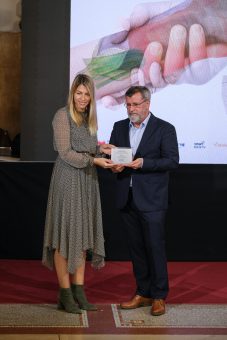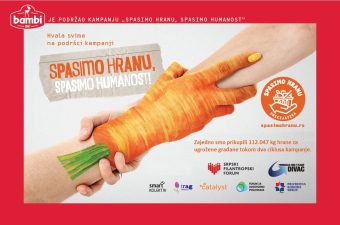
Did you know that nearly one-third of grown and produced food on the planet is thrown away or wasted? It means that almost 1.3 billion tonnes of food are never consumed. To reduce the volume of food waste in the European Union (EU), its members have been measuring food waste volumes in all phases of the food supply chain since 2020. This October, Eurostat announced the first statistical monitoring results regarding food waste volumes in the European Union per sector in 2020.
According to the data, in 2020, the first year of the COVID-19 pandemic, nearly 57 million tonnes of food waste was generated in the EU, or around 127 kilogrammes per inhabitant. Household food waste is twice the size of the waste generated by the sectors with strategies for food waste reduction, including primary food production and processing, food retail, distribution, etc. According to Eurostat, households in the EU generate 55 per cent of food waste, accounting for 70 kg per inhabitant.
The remaining 45 per cent is waste generated upwards in the food supply chain. The United Nations Environment Programme estimates that 2 million kilogrammes of food are wasted daily in Serbia. On the other hand, according to the latest data, 446,000 individuals cannot meet basic living needs. It is necessary to encourage cross-sectoral cooperation to additionally promote the reduction of waste food volumes and increase donated food, in addition to the improvement of the tax treatment of food donations. To that aim, the Coalition for Giving, including the Ana and Vlade Divac Foundation, Trag Foundation, Smart Kolektiv, Catalyst Balkans, Serbian Philanthropic Forum, CSR Forum and Chamber of Commerce and Industry of Serbia, supported by USAID, launched the “Save food, save humanity” campaign, marking the National Day of Giving in 2021.
IN FOCUS:
- WASTEWATER TREATMENT AND PRESERVATION OF FRESH WATER SOURCES
- CHARGE&GO IS EXPANDING THE CHARGING NETWORK
- WWF IS LOOKING FOR CREATIVE PROJECT IDEAS FROM THE CIVIL SECTOR
The campaign’s relevance has been recognized by numerous individuals and 50+ organizations, companies, and media outlets. The campaign has been highly successfully presented this year, with 112,047 kg of food collected for the most vulnerable individuals across the country in both cycles, thanks to a synergy of civil society organizations, companies, citizens, and media, with the campaign continuing until end-November.

“In the year of celebrating our 55th anniversary of operation, we have helped the most socially vulnerable individuals through donations to the Food Banks Belgrade, Vojvodina and Niš, within the “Save food, save humanity” campaign. In addition to donating our food, we have also provided media space to support the campaign and raise public awareness regarding the issue of excessive food waste in the most effective manner“, said Ivan Jovanović, Corporate Communications Manager in Bambi.
He added that he was particularly glad that, as a member of the Coca-Cola Hellenic Group, we have approached this project together, expressing solidarity in donated volumes of food and drinks. Through a range of activities, such as crowdfunding campaigns, food donations by producers, donation boxes in stores of the largest retail chains, zero banking fees for donations for purchasing staples for the vulnerable, the “Save food, save humanity” campaign has managed to demonstrate the relevance of joint and synergy action, focusing public attention on the necessity to tackle both issues – insufficient food donations and need for preventing food waste. In promoting this charitable campaign, the media have proven to be much-appreciated allies.
The speed and intensity of messages and ideas for rational food consumption reaching every individual in our country largely depend on their understanding and support. There is a saying in our country that time is money, but we are not sufficiently aware of the value of the food we waste, as it can be directed to the most vulnerable social groups while still safe for consumption. Therefore, it is important to be constantly reminded that food must not be wasted, that we should help one another, and that any food waste is a waste of resources and money. Furthermore, it is important to note that food with a short expiration date is burned, causing additional carbon dioxide emissions and affecting the environment. From that perspective, rational food management also confirms sustainable and responsible treatment of nature.
Therefore, we invite you to join us in the mission of increasing food donations and against food waste in Serbia at www.spasimohranu.rs.
Prepared by: Milica Radičević
Read the story in the new issue of the Energy portal Magazine RESPONSIBLE BUSINESS.



